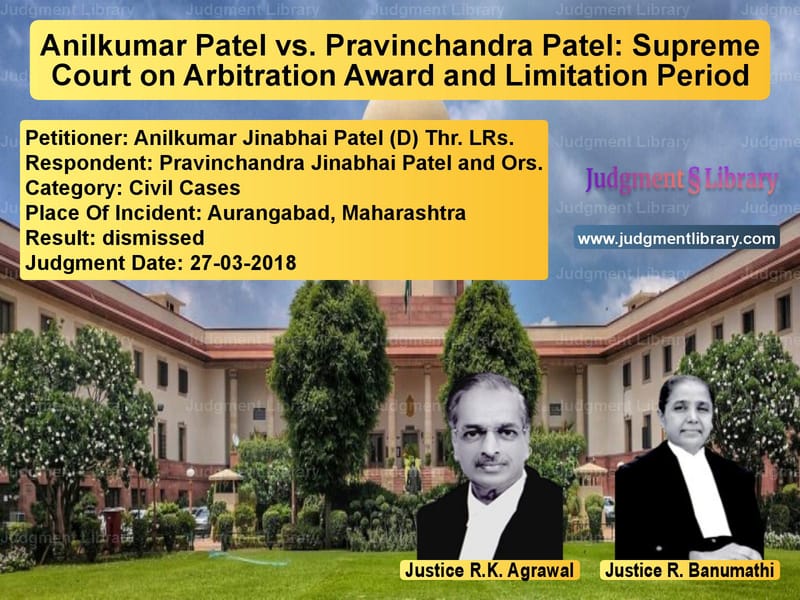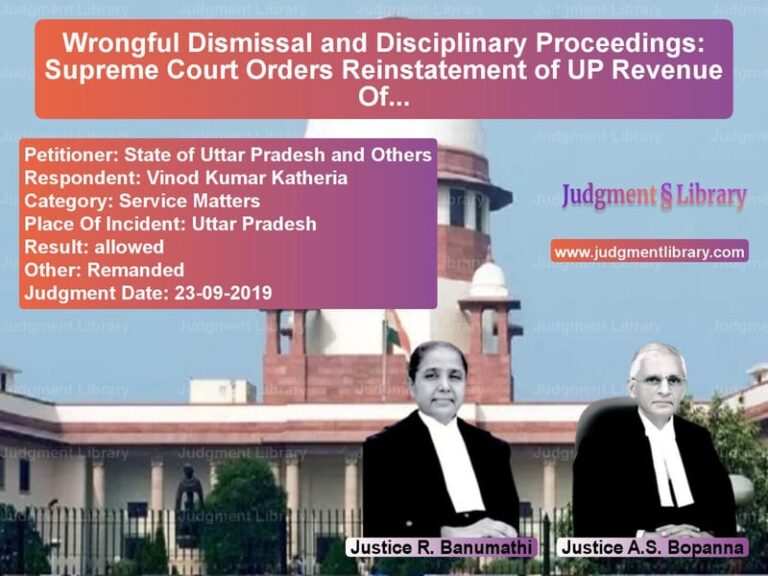Anilkumar Patel vs. Pravinchandra Patel: Supreme Court on Arbitration Award and Limitation Period
The case of Anilkumar Jinabhai Patel (D) Thr. LRs. vs. Pravinchandra Jinabhai Patel and Ors. involves a complex family dispute over an arbitration award. The Supreme Court had to decide whether the challenge to an arbitral award, which was filed under Section 34 of the Arbitration and Conciliation Act, 1996, was time-barred, based on when the appellant and his family members received the copy of the award.
Background of the Case
Pravinchandra Patel and Anilkumar Patel, two brothers, along with their family members, were involved in a business of fertilizer manufacturing, chemical production, and real estate. Over time, the family decided to divide the assets between them and appointed two arbitrators, Latikaben and Bhikhalal Nathalal Patel, to facilitate the division. The arbitration resulted in an award dated 07.07.1996, which allocated properties to both brothers.
However, in 2005, Anilkumar Patel and his family members challenged the arbitral award, claiming they only became aware of it in August 2005. The key issue in the case was whether the period of limitation for challenging the award began when Anilkumar Patel received the copy of the award or when the family members were notified of it.
Key Arguments
Petitioner’s Argument (Anilkumar Patel and Family)
- The petitioners argued that the limitation period for filing a challenge under Section 34 of the Arbitration and Conciliation Act should only start when they received the original signed copy of the arbitral award, as required under Section 31(5).
- They contended that they had no knowledge of the award until August 2005, when they were served with a notice of execution petition along with a copy of the award. Therefore, their challenge was filed within the allowable time frame.
- The petitioners also claimed that the award was not binding on them because it was not individually served on all relevant family members, as stipulated by law.
Respondent’s Argument (Pravinchandra Patel)
- Pravinchandra Patel contended that Anilkumar Patel, being the head of the family, was authorized to receive the award on behalf of himself and his family members. Thus, the receipt of the award by Anilkumar Patel on behalf of the family members should be considered as service of the award to all parties involved.
- He pointed to the fact that Anilkumar Patel had admitted to receiving the award and had used it in various legal proceedings, further proving that the family was aware of the award well before the petitioners’ challenge in 2005.
- Pravinchandra Patel argued that the appellants could not plead ignorance of the award when they had acted upon it in several other instances, including legal proceedings and internal communication.
Supreme Court’s Judgment
A bench comprising Justices R.K. Agrawal and R. Banumathi delivered the judgment, ruling on the following points:
1. Receipt of Award by Anilkumar Patel on Behalf of Family
The court found that Anilkumar Patel, as the head of the family, was authorized to receive the award on behalf of his family members. The endorsement on the award, stating that it was received for both himself and his family, was sufficient to satisfy the requirements under Section 31(5) of the Arbitration and Conciliation Act.
2. Knowledge of the Award and Limitation Period
The court agreed with the respondent that the limitation period for challenging the arbitral award began when Anilkumar Patel received the award, as he was the authorized representative of his family. Therefore, the challenge filed in 2005 was time-barred, as the petitioners had failed to file the challenge within the prescribed period after receiving the award.
3. High Court’s Judgment on Limitation
The Supreme Court upheld the High Court’s ruling, which had found that the petitioners were aware of the award and had used it in various legal proceedings. The court emphasized that it was not reasonable for the petitioners to claim ignorance of the award when they had actively referred to it in other matters.
4. Fraudulent Claims and Challenge to the Award
The court dismissed the claim of fraud raised by the petitioners, finding no evidence to support the allegation that the award was fabricated or biased. The fact that the award was signed by both brothers and their families further corroborated the legitimacy of the arbitration process.
5. No Interference with the High Court’s Decision
Based on the findings, the Supreme Court concluded that the petitioners’ challenge to the arbitral award was time-barred and affirmed the High Court’s decision to dismiss the challenge.
Conclusion
The Supreme Court’s ruling reinforced the importance of adhering to statutory timelines for challenging arbitral awards. The judgment also clarified the scope of service of an arbitral award, particularly in family disputes where one member may act on behalf of others. It underscores the principle that the limitation period for challenging an award begins when a party, or its authorized representative, receives the award, rather than when the entire family or all interested parties are individually notified.
Petitioner Name: Anilkumar Jinabhai Patel (D) Thr. LRs.Respondent Name: Pravinchandra Jinabhai Patel and Ors.Judgment By: Justice R.K. Agrawal, Justice R. BanumathiPlace Of Incident: Aurangabad, MaharashtraJudgment Date: 27-03-2018
Don’t miss out on the full details! Download the complete judgment in PDF format below and gain valuable insights instantly!
Download Judgment: Anilkumar Jinabhai P vs Pravinchandra Jinabh Supreme Court of India Judgment Dated 27-03-2018.pdf
Direct Downlaod Judgment: Direct downlaod this Judgment
See all petitions in Contract Disputes
See all petitions in Property Disputes
See all petitions in Specific Performance
See all petitions in Judgment by R K Agrawal
See all petitions in Judgment by R. Banumathi
See all petitions in dismissed
See all petitions in supreme court of India judgments March 2018
See all petitions in 2018 judgments
See all posts in Civil Cases Category
See all allowed petitions in Civil Cases Category
See all Dismissed petitions in Civil Cases Category
See all partially allowed petitions in Civil Cases Category







